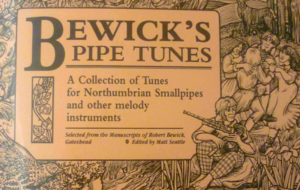Template:Featured Tune

The melody appears in the Northumbrian Bewick's Pipe Tunes as "Oh My Nanny," although "only the first strains correspond in detail" (Seattle). The melody appears in the Drummond Castle Manuscript in the possession of the Earl of Ancaster; it is inscribed "A Collection of Country Dances written for the use of his Grace the Duke of Perth by Dav. Young, 1734". Robert Bremner prints a version in his 1757 Collection of Scots Reels, which John Glen (1891), evidently not knowing of Young's MS, thought was the earliest printing. The title also appears in Henry Robson's list (as "Hey, My Nanny, My Nanny") of popular Northumbrian song and dance tunes ("The Northern Minstrel's Budget"), which he published c. 1800. The tune "Hunt the Fox" in Ryan's Mammoth Collection/Cole's 1000 is very similar. There is some thought "Hey My Nanny" may be the ancestor of "Drops of Brandy (1)." Irish collector Frank Roche's "Up in the Garret I am" is a distanced version, most similar to the version that the Gows published.
Printed sources: Aird (Selection of Scotch, English, Irish and Foreign Airs, vol. 5), Glasgow, 1797; No. 99 p. 38. Bremner (Scots Reels), c. 1757; p. 46. Carlin (The Gow Collection), 1986; No. 411. Gow (Complete Repository, Part 3), 1806; pp. 24-25 (appears as "Hay my Nanny"). Hime (Forty Eight Original Irish Dances Never Before Printed with Basses), Dublin, 1804; No. 11 (as "Hey me Nancy"). Huntington (William Litten's Tune Book), 1977; p. 32 (appears as "Hey My Nancy"). Kennedy (Fiddler's Tune-Book: Slip Jigs and Waltzes), 1999; No. 28, p. 8. Oswald (Caledonian Pocket Companion, Book V), 1760; p. 8. Seattle (Great Northern/William Vickers), 1987, Part 2; No. 293. Walsh (Caledonian Country Dances), c. 1745; p. 62. Wright (Wright's Compleat Collection of Celebrated Country Dances), 1740; p. 55. David Young (Drummond Castle/Duke of Perth Manuscript), 1734; No. 23.
HEY MY NANNY full Score(s) and Annotations and Past Featured Tunes
X:1 T:Hey my Nanny M:9/8 L:1/8 R:Slip Jig K:Amix g|Tf2A (ce)A (ce)A|Tf2A (ce)A Bdg|Tf2A (ce)A (ce)f| gfe dBG (Bd):||:g|(fg)a (ef)e (ce)g|(fg)a (ac)A (Bd)g| (fg)a (ef)e (ce)f|(gf)e (dB)G (Bd):|]
